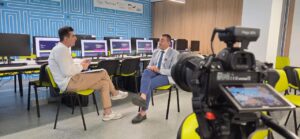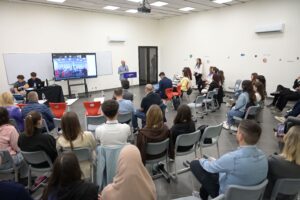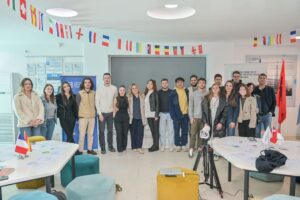From May 16 to 18, 2025, the capital of Albania became a hub of global scientific dialogue as the University Metropolitan Tirana, in collaboration with the prestigious IKSAD Institute (Institute of Economic Development and Social Research), hosted the 12th International European Congress on Advances in Basic Sciences (ECSR 2025). This major academic event welcomed over 500 participants from more than 20 countries, uniting minds from across Europe, Asia, Africa, and the Middle East.
Held at UMT’s Metropolitan Innovation Center, the congress featured more than 230 research presentations spanning a wide range of disciplines from engineering, architecture, and health sciences to arts, digital design, and interdisciplinary studies. It marked a defining moment for Albania’s role in international academic cooperation and innovation leadership.
A Powerful Collaboration for Science and Innovation
“This congress was the result of shared vision and partnership,” noted Professor Emre Çeçen, Vice Dean of the Faculty of Engineering and Architecture at UMT. “Working with the IKSAD Institute gave us the reach, the structure, and the global network to make this event a true success not just in numbers, but in impact.”
The collaboration with IKSAD an institution known for supporting scientific congresses and academic publishing ensured that ECSR 2025 maintained rigorous standards while expanding its reach into new academic and geographic territories.
“By partnering with IKSAD, we opened new doors for scholars from underrepresented regions and promoted the exchange of knowledge on a truly global scale,” Prof. Çeçen emphasized.
An International Stage for Interdisciplinary Excellence
Structured around four core themes:
- Arts & Multidisciplinary Studies
- Health & Applied Sciences
- Architecture & Urban Design
- Engineering & Digital Design the congress welcomed scholars, young investigators, and professionals who presented cutting-edge research on everything from AI-powered city planning to eco-conscious healthcare systems, blockchain security, and urban mobility innovation.
The event featured powerful keynote lectures, including those by Dr. Karel Smejkal, founder of the Inspireli Awards, who highlighted the potential of design-driven education, and Dr. Paolo Vimercati, urban regeneration expert and professor at Oxford Brookes University and UMT, who presented models for human-centric sustainable cities.
“Design in the City”: Turning Tirana into a Living Lab
A standout feature of ECSR 2025 was the “Design in the City” initiative a hands-on urban innovation programme that invited congress participants to directly engage with Tirana’s streets, neighborhoods, and citizens. Through walking workshops, live design prototyping, and open forums, delegates proposed solutions to real urban challenges, merging academic thought with public participation.
“Design in the City was one of the congress’s most meaningful components,” said Prof. Çeçen. “It showed that science and creativity can go hand in hand, and that cities like Tirana are ideal laboratories for experimenting with sustainable, human-focused design.”
Academic Excellence and Global Recognition
All accepted contributions were published in an ISBN-registered proceedings book, with select authors invited to expand their work for publication in leading journals indexed in Scopus and Web of Science. Awards for Best Paper, Young Investigator, and Design-for-Impact were also presented to recognize outstanding contributions.
Participants praised the congress for its high-quality content, warm hospitality, and the unique opportunity to experience Tirana from cultural heritage tours and traditional cuisine to scenic visits to Mount Dajti and the bustling Pazari i Ri market.
As the event concluded, there was unanimous agreement that ECSR 2025 marked a transformative moment for Albania’s academic landscape.
“We are proud of what we achieved together with IKSAD,” Prof. Çeçen stated. “This congress has proven that Tirana can be a home for world-class research, interdisciplinary innovation, and global collaboration. And we’re just getting started.




